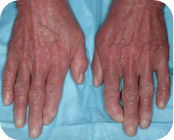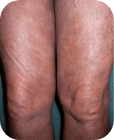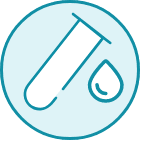Jeffrey’s journey with Sézary Syndrome (SS)
“I know I have cancer, but now I have something to look forward to again.”
See Jeffrey’s full storySézary Syndrome (SS) is less common than Mycosis Fungoides (MF) and can have different symptoms

Waxy erythroderma
in SSa

Exfoliative
erythroderma in SSa
aImages courtesy of Dr Oleg Akilov.

Stay ahead of your Sézary Syndrome (SS). Talk to your doctor about receiving additional blood testing if you experience any new or worsening symptoms
Jeffrey’s journey with Sézary Syndrome (SS)
“I know I have cancer, but now I have something to look forward to again.”
See Jeffrey’s full storyWhat is POTELIGEO®
(mogamulizumab-kpkc)?
POTELIGEO is a prescription medicine used to treat mycosis fungoides (MF) or Sézary syndrome (SS) in adults who have tried at least one prior medicine (taken by mouth or injection) that did not work or in whom the disease has come back.
Important Safety Information
What is the most important information I should know about POTELIGEO?
POTELIGEO may cause serious side effects that can be severe or life-threatening including skin problems, infusion reactions, infections, autoimmune problems, and complications from stem cell transplant.
Call or see your healthcare provider right away if you develop any symptoms of the following problems or if these symptoms get worse:
What are the most common side effects of POTELIGEO?
The most common side effects of POTELIGEO include rash, tiredness, diarrhea, muscle and bone pain, and upper respiratory tract infection.
Before starting POTELIGEO treatment, tell your doctor about all your medical conditions, including whether you:
Tell your doctor about all the medicines you take, including prescription and over-the-counter medicines, vitamins, and herbal supplements.
You are encouraged to report suspected adverse reactions to Kyowa Kirin, Inc. at 1-844-768-3544 or FDA at 1-800-FDA-1088 or www.fda.gov/medwatch.
Please see full Prescribing Information as well as Patient Information.